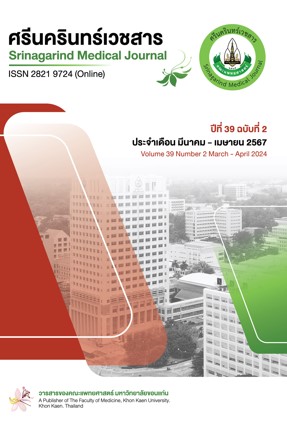Effect of Self-Management Program on Health Related Quality of Life in Patients with Diabetic Retinopathy
Keywords:
self-management program, health related quality of life, patients with diabetic retinopathyAbstract
Background and Objective: Diabetic retinopathy can lead to ocular disturbances and loss of vision. The evidence showed that self-management program could increase quality of life in patients with diabetic retinopathy. This study aimed to investigate the effect of self-management program on health-related quality of life in patients with diabetic retinopathy.
Materials and Methods: Quasi-experimental research with two group pretest-posttest design. The subjects were type2 diabetes’s adult between 18-59 years old patients with diabetic retinopathy in the Eye clinic at Out patients department, Srinagarind Hospital. The 72 samples with purposive sampling were equally divided into control and experimental group of 36 persons each. The control group received routine nursing care only, but the experimental group received the self-management program. The self-management program was based on Lorig and Holman’s concept of self-management combined with Diabetes Self-Management Education. The duration time of the program was conducted over a period of 12 weeks. The instrumentation for collecting data were a demographic data form and Thai Visual Function Questionnaire. The instrumentation was tested for reliability with Cronbrach’s alpha coefficient at .82. The data were analyzed by using frequency, percentage, mean, and standard deviation. The hypotheses were test using paired sample t- test and independent sample t –test
Result: The mean score level of health-related quality of life after experiment of experimental group were statistically significant higher (84.61±6.22) than before experiment (82.19±9.42) (t-test = 2.61) and also higher than control group (73.99±12.56) (t-test = 4.55) at the level of p< .05
Conclusion: The self-management program could increase health-related quality of life in patients with diabetic retinopathy.
References
Boonsaen T, Choksakunwong S, Lertwattanarak R. Prevalence of and Factors Associated with Diabetic Retinopathy in Patients with Diabetes Mellitus at Siriraj Hospital - Thailand's Largest National Tertiary Referral Center. Diabetes Metab Syndr Obes 2021;14:4945-57. doi:10.2147/DMSO. S346719
Boontakanon J. Prevalence and Factors Associated with Diabetic Retinopathy in type-2 diabetes mellitus in Primary Care Unit at Kasetsomboon Hospital. medical journal of Srisaket Surin Buriram Hospitals 2022;37(2):341-51.
Roberts-Martínez Aguirre I, Rodríguez-Fernández P, González-Santos J, et al. Exploring the Quality of Life Related to Health and Vision in a Group of Patients with Diabetic Retinopathy. Healthcare 2022;10(1):142. doi:10.3390/healthcare10010142
Chatreewarote M, Navicharern R. Factors related to quality of life in patients with diabetic retinopathy. Journal of Nursing Science Chulalong¬korn University 2015;27(1):70-82.
Muksiritipanun B, Monthaisong D. Factors related to quality of life in patients with diabetic retinopathy. Journal of the Royal Thai Army Nurses 2014;15(2): 395-404.
Beck J, Greenwood DA, Blanton L, Sandra T, Marcene K, Condon JE, et al. 2017 National Standards for diabetes self-management education and support. Diabetes Educ 2018; 44(1):35-50. doi:10.1177/0145721718754797
Burson R, Katherine J. The AADE 7. Home Healthcare Nurse 2014;32(9):556.doi: 10.1097/ NHH.0000000000000144
Lorig KR, Holman H. Self-management education: history definition outcomes and mechanisms. Ann Behav Med 2003;26(1):1-7. doi:10.1207/ S15324796ABM2601_01
Girdler SJ, Boldy DP, Dhaliwal SS, Crowley M, Packer TL. Vision self-management for older adults: a randomised controlled trial. Br J Ophthalmol 2010;94(2):223-8. doi:10.1136/ bjo.2008.147538
Lalun A, Wirunphan B. Effects of self-management programs on hemoglobin A1C levels and quality of life in people with diabetes mellitus in the district of Kanghhro Hospital, Chaiyaphum province. Journal of Boromarajonani College of Nursing 2021;11(1):66-80.
Cohen J. Statistical power analysis. Current Directions in Psychological Science 1992;1(3): 98-101.
Fain JA. 2017 National Standards for Diabetes Self-Management Education and Support (DSMES): Revised and Updated. Diabetes Educ 2017;43(5): 439. doi:10.1177/0145721717729355
Jiamjarasrangsi W, Navicharern R, Attavorrarat S, Manit A, Aekplakorn W, Keesukphan P. Identification of potential leverage points for self-Management support intervention in Thais with type 2 diabetes. J Med Assoc Thai 2017;100(3):326-38.
Chaiyasong C, Pratheepawanit N, Asawaphureekorn S, Anutaungkoon W, Inthayung S. Health related quality of life instruments for glaucoma: a comprehensive review. J Med Assoc Thai 2005; 88(9):155-62.
Cheng L, Sit JWH, Choi K, Chair S, Li X, Wu Y, et al. The effects of an empowerment-based self-management intervention on empowerment level, psychological distress, and quality of life in patients with poorly controlled type 2 diabetes: A randomized controlled trial. Int J Nurs Stud 2021;116(1):103407. doi:10.1016/j.ijnurstu.2019. 103407
Downloads
Published
How to Cite
Issue
Section
License
Copyright (c) 2024 Srinagarind Medical Journal

This work is licensed under a Creative Commons Attribution-NonCommercial-NoDerivatives 4.0 International License.




